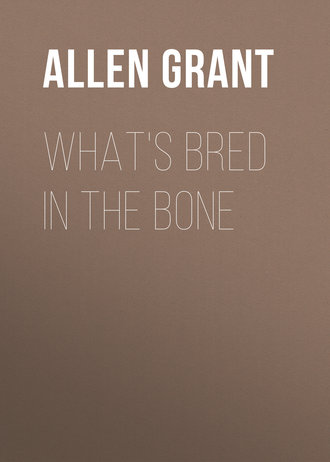 полная версия
полная версияWhat's Bred in the Bone
Still, things went indifferently with them. As they lived and worked together in their native hut by Khatsua's village, a change began slowly but irresistibly to come over Granville Kelmscott's feelings towards his unacknowledged half-brother. At first, it was with the deepest sense of distaste and loathing that the dispossessed heir found himself compelled to associate with Guy Waring in such close companionship. But, bit by bit, as they two saw more and more of one another, this feeling of distaste began to wear off piecemeal. Granville Kelmscott was more than half ashamed to admit it even to himself, but in process of time he really almost caught himself beginning to like—well, to like the man he believed to be a murderer. It was shocking and horrible, no doubt; but what else was he to do? Guy formed now his only European society. By the side of those savage Barolongs, whose chief thought nothing of perpetrating the most nameless horrors before their very eyes, for the gratification of mere freaks of passion or jealousy, a European murderer of the gentlemanly class seemed almost by comparison a mild and gentle personage. Granville hardly liked to allow it in his own mind, but it was nevertheless the case; he was getting positively fond of this man, Guy Waring.
Besides, blood is generally thicker than water. Living in such close daily communion with Guy, and talking with him unrestrainedly at last upon all possible points—save that one unapproachable one, which both seemed to instinctively avoid alluding to in any way—Granville began to feel that, murderer or no murderer, Guy was in all essentials very near indeed to him. Nay, more, he found himself at times actually arguing the point with his own conscience that, after all, Guy was a very good sort of fellow; and if ever he had murdered Montague Nevitt at all—which looked very probable—he must have murdered him under considerably extenuating circumstances.
There was only one thing about Guy that Granville didn't like when he got to know him. This homicidal half-brother of his was gentle as a woman; tender, kindhearted, truthful, affectionate; a gentleman to the core, and a jolly good fellow into the bargain; but—there's always a but—he was a terrible money-grubber! Even there in the lost heart of Africa, at such a distance from home, with so little chance of ever making any use of his hoarded wealth, the fellow used to hunt up those wretched small stones, and wear them night and day in a belt round his waist, as if he really loved them for their own mere sakes—dirty high-priced little baubles! Granville, for his part, couldn't bear to see such ingrained love of pelf. It was miserable; it was mercenary.
To be sure, he himself hunted diamonds every day of his life, just as hard as Guy did; there was nothing else to do in this detestable place, and a man MUST find something to turn his idle hands to. Also he carried them, like Guy, bound up in a girdle round his own waist; it was a pity they should be lost, if ever he should chance to get away safe in the end to England. But then, don't you see, the cases were so different. Guy hoarded up his diamonds for mere wretched gain; whereas Granville valued his (he said to himself often) not for the mere worth in money of those shimmering little trinkets, but for his mother's sake, and Gwendoline's, and the credit of the family. He wanted Lady Emily to see her son filling the place in the world she had always looked forward with hope to his filling; and, by Heaven's help, he thought, he could still fill it. He couldn't marry Gwendoline on a beggar's pittance; and, by Heaven's help, he hoped still to be able to marry her.
Guy, on the other hand, found himself almost equally surprised in turn at the rapid way he grew really to be fond of Granville Kelmscott. Though Kelmscott knew, as he thought, the terrible secret of his half-unconscious crime—for he could feel now how completely he had acted under Montague Nevitt's compelling influence—Guy was aware before long of such a profound and deep-seated sympathy existing between them, that he became exceedingly attached in time to his friendly fellow-prisoner. In spite of the one barrier they could never break down, he spoke freely by degrees to Granville of everything else in his whole life; and Granville in return spoke to him just as freely. A good fellow, Granville, when you got to know him. There was only a single trait in his character Guy couldn't endure; and that was his ingrained love of money-grubbing. For the way the man pounced down upon those dirty little stones, when he saw them in the mud, and hoarded them up in his belt, and seemed prepared to defend them with his very life-blood, Guy couldn't conceal from himself-the fact that he fairly despised him. Such vulgar, common-place, unredeemed love of pelf! Such mere bourgeois avarice! Of what use could those wretched pebbles be to him here in the dusty plains of far inland Africa?
Guy himself kept close count of his finds, to be sure; but then, the cases, don't you see, were so different! HE wanted his diamonds to discharge the great debt of his life to Cyril, and to appear an honest man, rehabilitated once more, before the brother he had so deeply wronged and humiliated. Whereas Granville Kelmscott, a rich man's son, and the heir to a great estate beyond the dreams of avarice—that HE should have come risking his life in these savage wilds for mere increase of superfluous wealth, why, it was simply despicable.
So eighteen months wore away, in mutual friendship, tempered to a certain degree by mutual contempt, and little chance of escape came to the captives in Barolong land.
At last, as the second winter came round once more, for two or three weeks the Englishmen in their huts began to perceive that much bustle and confusion was going on all around in King Khatsua's dominions. Preparations for a war on a considerable scale were clearly taking place. Men mustered daily on the dusty plain with firearms and assegais. Much pombè was drunk; many palavers took place; a constant drumming of gongs and tom-toms disturbed their ears by day and by night. The Englishmen concluded some big marauding expedition was in contemplation. And they were quite right. King Khatsua was about to concentrate his forces for an attack on a neighbouring black monarch, as powerful and perhaps as cruel as himself, Montisive of the Bush Veldt.
Slowly the preparations went on all around. Then the great day came at last, and King Khatsua set forth on his mighty campaign, to the sound of big drums and the blare of native trumpets.
When the warriors had marched out of the villages on their way northward to the war, Guy saw the two prisoners' chance of escape had arrived in earnest. They were guarded as usual, of course; but not so strictly as before; and during the night, in particular, Guy noticed with pleasure, little watch was now kept upon them. The savage, indeed, can't hold two ideas in his head at once. If he's making war on his neighbour on one side, he has no room left to think of guarding his prisoners on the other.
"To-night," Guy said, one evening, as they sat together in their hut, over their native supper of mealie cakes and springbok venison, "we must make a bold stroke. We must creep out of the kraal as well as we can, and go for the sea westward, through Namaqua land to Angra Pequena."
"Westward?" Granville answered, very dubiously. "But why westward, Waring? Surely our shortest way to the coast is down to Kimberley and so on to the Cape. It'll take us weeks and weeks to reach the sea, won't it, by way of Namaqua land?"
"No matter for that," Guy replied, with confidence. He knew the map pretty well, and had thought it all over. "As soon as the Barolong miss us in the morning, they'll naturally think we've gone south, as you say, towards our own people. So they'll pursue us in that direction and try to take us; and if they were to catch us after we'd once run away, you may be sure they'd kill us as soon as look at us. But it would never occur to them, don't you see, we were going away west. They won't follow us that way. So west we'll go, and strike out for the sea, as I say, at Angra Pequena."
They sat up through the night discussing plans low to themselves in the dark, till nearly two in the morning. Then, when all was silent around, and the Barolong slept, they stole quietly out, and began their long march across the country to westward. Each man had his diamonds tied tightly round his waist, and his revolver at his belt. They were prepared to face every unknown danger.
Crawling past the native huts with very cautious steps, they made for the open, and emerged from the village on to the heights that bounded the valley of the Lugura. They had proceeded in this direction for more than an hour, walking as hard as their legs would carry them, when the sound of a man running fast, but barefoot, fell on their ears from behind in a regular pit-a-pat. Guy looked back in dismay, and saw a naked Barolong just silhouetted against the pale sky on the top of a long low ridge they had lately crossed over. At the very same instant Granville raised his revolver and pointed it at the man, who evidently had not yet perceived them. With a sudden gesture of horror, Guy knocked down his hand and prevented his taking aim.
"Don't shoot," he cried, in a voice of surprised dismay and disapproval. "We mustn't take his life. How do we know he's an enemy at all? He mayn't be pursuing us."
"Best shoot on spec, anyway," Granville answered, somewhat discomposed. "All's fair in war. The fellow's after us no doubt. And, at any rate, if he sees us he may go and report our whereabouts to the village."
"What? shoot an unarmed man who shows no signs of hostility! Why, it would be sheer murder," Guy cried, with some horror. "We mustn't make our retreat on THOSE principles, Kelmscott; it'd be quite indefensible. I decline to fire except when we're attacked. I won't be any party, myself, to needless bloodshed."
Granville Kelmscott gazed at him, there in the grey dawn, in unspeakable surprise. Not shoot at a negro! In such straits, too, as theirs! And this rebuke had come to him—from the mouth of the murderer!
Turn it over as he might, Granville couldn't understand it.
The Barolong ran along on the crest of the ridge, still at the top of his speed, without seeming to notice them in the gloom of the valley. Presently, he disappeared over the edge to southward. Guy was right, after all. He wasn't in pursuit of them. More likely he was only a runaway slave, taking advantage, like themselves, of King Khatsua's absence.
CHAPTER XXXV.
PERILS BY THE WAY
Three weeks later, two torn and tattered, half-starved Europeans sat under a burning South African sun by the dry bed of a shrunken summer torrent. It was in the depths of Namaqua land, among the stony Karoo; and the fugitives were straggling, helplessly and hopelessly, seaward, thirsty and weary, through a half-hostile country, making their marches as best they could at dead of night and resting by day where the natives would permit them.
Their commissariat had indeed been a lean and hungry one. Though they carried many thousand pounds' worth of diamonds about their persons, they had nothing negotiable with which to buy food or shelter from the uncivilized Namaquas. Ivory, cloth, and beads were the currency of the country. No native thereabouts would look for a moment at their little round nobs of water-worn pebbles. The fame of the diamond fields hadn't penetrated as yet so far west in the land as to have reached to the huts of the savage Namaquas.
And now their staying power was almost worn out Granville Kelmscott lay down on the sandy soil with a wild gesture of despair. All around were bare rocks and the dry sweltering veldts, covered only with round stones and red sand and low bushy vegetation.
"Waring," he said feebly, in a very faint voice, "I wish you'd leave me and go on by yourself. I'm no good any more. I'm only a drag upon you. This fever's too bad for me to stand much longer. I can never pull through to the coast alive. I've no energy left, were it even to try. I'd like to lie down here and die where I sit. Do go and leave me."
"Never!" Guy answered resolutely. "I'll never desert you, Kelmscott, while I've a drop of blood left. If I carry you on my back to the coast, I'll get you there at last, or else we'll both die on the veldt together."
Granville held his friend's hand in his own fevered fingers as he might have held a woman's.
"Oh, Waring," he cried once more, in a voice half choked with profound emotion, "I don't know how to thank you enough for all you've done for me. You've behaved to me like a brother—like a brother indeed. It makes me ashamed to think, when I see how unselfish, and good, and kind you've been—ashamed to think I once distrusted you. You've been an angel to me all through. Without you, I don't know how I could ever have lived on through this journey at all. And I can't bear to feel now I may spoil your retreat—can't bear to know I'm a drag and burden to you."
"My dear fellow," Guy said, holding the thin and fevered hand very tenderly in his, "don't talk to me like that. I feel to you every bit as you feel to me in this matter. I was afraid of you at first, because I knew you misunderstood me. But the more I've seen of you, the better we've each of us learned to sympathize with the other. We've long been friends. I love you now, as you say, like a brother."
Granville hesitated for a moment. Should he out with it or not? Then at last the whole long-suppressed truth came out with a burst. He seized his companion's two hands at once in a convulsive grasp.
"That's not surprising either," he said, "after all—for Guy, do you know, we ARE really brothers!"
Guy gazed at him in astonishment. For a moment he thought his friend's reason was giving way. Then slowly and gradually he took it all in.
"ARE really brothers!" he repeated, in a dazed sort of way. "Do you mean it, Kelmscott? Then my father and Cyril's—"
"Was mine too, Waring. Yes; I couldn't bear to die without telling you that. And I tell it now to you. You two are the heirs of the Tilgate estates. And the unknown person who paid six thousand pounds to Cyril, just before you left England, was your father and mine—Colonel Henry Kelmscott."
Guy bent over him for a few seconds in speechless surprise. Words failed him at first. "How do you know all this, Kelmscott?" he said at last faintly.
Granville told him in as few words as possible—for indeed he was desperately weak and ill—by what accident he had discovered his father's secret. But he told him only what he knew himself. For, of course, he was ignorant as yet of the Colonel's seizure and sudden death on the very day after they had sailed from England.
Guy listened to it all in profound silence. It was a strange, and for him a momentous tale. Then he said at last, as Granville finished, "And you never told me this all these long months, Kelmscott."
"I always meant to tell you, Guy," his half-brother answered, in a sudden fit of penitence. "I always meant in the end you and your brother Cyril should come into your own at Tilgate as you ought. I was only waiting—"
"Till you'd realized enough to make good some part of your personal loss," Guy suggested, not unkindly.
"Oh no," Granville answered, flushing up at the suggestion. "I wasn't waiting for that. Don't think me so mercenary. I was waiting for YOU, in your turn to extend to ME your own personal confidence. You know, Guy," he went on, dropping into a still more hushed and solemn undertone, "I saw an evening paper the night we left Plymouth—"
"Oh, I know, I know," Guy cried, interrupting him, with a very pale face. "Don't speak to me of that. I can't bear to think of it. Kelmscott, I was mad when I did that deed. I wasn't myself. I acted under somebody else's compulsion and influence. The man had a sort of hypnotic power over my will, I believe. I couldn't help doing whatever he ordered me. It was he who suggested it. It was he that did it. And it's he who was really and truly guilty."
"And who was that man?" Granville Kelmscott asked with some little curiosity.
"There's no reason I shouldn't tell you," Guy answered, "now we've once broken the ice; and I'm glad in my heart, I must say, that we've broken it. For a year and a half, day and night, that barrier has been raised between us always, and I've longed to get rid of it. But I was afraid to speak of it to you, and you to me! Well, the man, if you must know, was Montague Nevitt!"
Granville Kelmscott looked up at him in credulous surprise. But he was too ill and weak to ask the meaning of this riddle. Montague Nevitt! What on earth could Waring mean by that? How on earth could Montague Nevitt have influenced and directed him in assaulting and murdering Montague Nevitt?
For a long time there was silence. Each brother was thinking his own thoughts to himself about this double disclosure. At last, Granville lifted his head and spoke again.
"And you'll go home to England now," he said, "under an assumed name, I suppose; and arrange with your brother Cyril for him to claim the Kelmscott estates, and allow you something out of them in retirement somewhere."
"Oh no," Guy answered manfully. "I'm going home to England now, if I go at all, under my own proper name that I've always borne, to repay Cyril in full every penny I owe him, to make what reparation I can for the wrong I've done, and to give myself up to the police for trial."
Granville gazed at him, more surprised and more admiring than ever.
"You're a brave man, Waring," he said slowly. "I don't understand it at all. But I know you're right. And I almost believe you. I almost believe it was not your fault. I should like to get through to England after all, if it was only to see you safe out of your troubles."
Guy looked at him fixedly.
"My dear fellow," he said, in a compassionate tone, "you mustn't talk any more. You've talked a great deal too much already. I see a hut, I fancy, over yonder, beside that dark patch of brush. Now, you must do exactly as I bid you. Don't struggle or kick. Lie as still as you can. I'll carry you there on my back, and then we'll see if we can get you anyhow a drop of pure water."
CHAPTER XXXVI.
DESERTED
That was almost the last thing Granville Kelmscott knew. Some strange shadowy dreams, to be sure, disturbed the lethargy into which he fell soon after; but they were intermittent and indefinite. He was vaguely aware of being lifted with gentle care into somebody's arms, and of the somebody staggering along with him, not without considerable difficulty, over the rough stony ground of that South African plateau. He remembered also, as in a trance, some sound of angry voices—a loud expostulation—a hasty palaver—a long slow pause—a gradual sense of reconciliation and friendliness—during all which, as far as he could recover the circumstances afterwards, he must have been extended on the earth, with his back propped against a great ledge of jutting rock, and his head hanging listless on his sinking breast. Thenceforward all was blank, or just dimly perceived at long intervals between delirium and unconsciousness. He was ill for many days, where or how he knew not.
In some half dreamy way, he was aware too, now and again, of strange voices by his side, strange faces tending him. But they were black faces, all, and the voices spoke in deep guttural tones, unlike even the clicks and harsh Bantu jerks with which he had grown so familiar in eighteen months among the Barolong. This that he heard now, or seemed to hear in his delirium, like distant sounds of water, was a wholly different and very much harsher tongue—the tongue of the Namaquas, in fact, though Granville was far too ill and too drowsy just then to think of reasoning about it or classifying it in any way. All he knew for the moment was that sometimes, when he turned round feebly on his bed of straw, and asked for drink or help in a faltering voice, no white man appeared to answer his summons. Black, faces all—black, black, and unfamiliar. Very intermittently he was conscious of a faint sense of loneliness. He knew not why. But he thought he could guess. Guy Waring had deserted him!
At last, one morning, after more days had passed than Granville could possibly count, all of a sudden, in a wild whirl, he came to himself again at once, with that instant revulsion of complete awakening which often occurs at the end of long fits of delirium in malarious fever. A light burst in upon him with a flash. In a moment, his brain seemed to clear all at once, and everything to grow plain as day before him. He raised himself on one wasted elbow and gazed around him with profound awe. He saw it all now; he remembered everything, everything.
He was alone, among savages in the far heart of Africa.
He lay on his back, on a heap of fresh straw, in a close and filthy mud-built hut. Under his aching neck a wooden pillow or prop of native make supported his head. Two women and a man bent over him and smiled. Their faces, though black, were far from unkindly. They were pleased to see him stare about with such meaning in his eyes. They were friendly, no doubt. They seemed really to take an interest in their patient's recovery.
But where was Guy Waring? Dead? Dead? Or run away? Had his half-brother, in this utmost need, then, so basely deserted him?
For some minutes, Granville gazed around him, half dazed, and in a turmoil of surprise, yet with a vivid passion of acute inquiry. Now he was once well awake, he must know all immediately. But how? Who to ask? This was terrible, terrible. He had no means of intercommunication with the people in the hut. He knew none of their language, nor they of his. He was utterly alone, among unmitigated savages.
Meanwhile, the man and the women talked loud among themselves in their own harsh speech, evidently well pleased and satisfied at their guest's improvement. With a violent effort, Granville began to communicate with them in the language of signs which every savage knows as he knows his native tongue, and in which the two Englishmen had already made some progress during their stay in Barolong land.
Pointing first to himself, with one hand on his breast, he held up two fingers before the observant Namaqua, to indicate that at first there had been a couple of them on the road, both white men. The latter point he still further elaborated by showing the white skin on his own bare wrist, and once more holding up the two fingers demonstratively. The Namaqua nodded. He had seized the point well. He held up two fingers in return himself; then looked at his own black wrist and shook his head in dissent—they were not black men; after which he touched Granville's fair forearm with his hand; yes, yes, just so; he took it in; two white men.
What had become of the other one? Granville asked in the same fashion, by looking around him on all sides in dumb show, inquiringly. One finger only was held up now, pointing about the hut; one hand was laid upon his own breast to show that a single white man alone remained. He glanced about him uneasily. What had happened to his companion?
The Namaqua pointed with his finger to the door of the hut, as much as to say the other man was gone. He seized every sign at once with true savage quickness.
Then Granville tried once more. Was his companion dead? Had he been killed in a fight? Was that the reason of his absence? He lunged forward with his hand holding an imaginary assegai. He pressed on upon the foe; he drove it through a body. Then he fell, as if dead, on the floor, with a groan and a shriek. After which, picking himself up as well as he was able, and crawling back to his straw, he proceeded in mute pantomime to bury himself decently.
The Namaqua shook his head again with a laugh of dissent. Oh no; not like that. It had happened quite otherwise. The missing white man was well and vigorous, a slap on his own chest sufficiently indicated that news. He placed his two first fingers in the ground, astride like legs, and made them walk along fast, one in front of the other. The white man had gone away. He had gone on foot. Granville nodded acquiescence. The savage took water in a calabash and laid it on the floor. Then he walked once more with his fingers, as if on a long and weary march, to the water's brink. Granville nodded comprehension again. He understood the signs. The white man had gone away, alone, on foot—and seaward.









